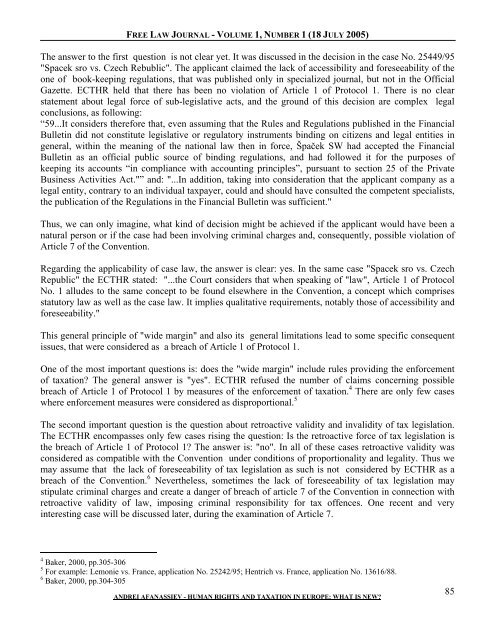Free_Law_Journal-Vol.. - Free World Publishing Inc.
Free_Law_Journal-Vol.. - Free World Publishing Inc.
Free_Law_Journal-Vol.. - Free World Publishing Inc.
You also want an ePaper? Increase the reach of your titles
YUMPU automatically turns print PDFs into web optimized ePapers that Google loves.
FREE LAW JOURNAL - VOLUME 1, NUMBER 1 (18 JULY 2005)<br />
The answer to the first question is not clear yet. It was discussed in the decision in the case No. 25449/95<br />
"Spacek sro vs. Czech Rebublic". The applicant claimed the lack of accessibility and foreseeability of the<br />
one of book-keeping regulations, that was published only in specialized journal, but not in the Official<br />
Gazette. ECTHR held that there has been no violation of Article 1 of Protocol 1. There is no clear<br />
statement about legal force of sub-legislative acts, and the ground of this decision are complex legal<br />
conclusions, as following:<br />
“59...It considers therefore that, even assuming that the Rules and Regulations published in the Financial<br />
Bulletin did not constitute legislative or regulatory instruments binding on citizens and legal entities in<br />
general, within the meaning of the national law then in force, Špaček SW had accepted the Financial<br />
Bulletin as an official public source of binding regulations, and had followed it for the purposes of<br />
keeping its accounts “in compliance with accounting principles”, pursuant to section 25 of the Private<br />
Business Activities Act."” and: "...In addition, taking into consideration that the applicant company as a<br />
legal entity, contrary to an individual taxpayer, could and should have consulted the competent specialists,<br />
the publication of the Regulations in the Financial Bulletin was sufficient."<br />
Thus, we can only imagine, what kind of decision might be achieved if the applicant would have been a<br />
natural person or if the case had been involving criminal charges and, consequently, possible violation of<br />
Article 7 of the Convention.<br />
Regarding the applicability of case law, the answer is clear: yes. In the same case "Spacek sro vs. Czech<br />
Republic" the ECTHR stated: "...the Court considers that when speaking of "law", Article 1 of Protocol<br />
No. 1 alludes to the same concept to be found elsewhere in the Convention, a concept which comprises<br />
statutory law as well as the case law. It implies qualitative requirements, notably those of accessibility and<br />
foreseeability."<br />
This general principle of "wide margin" and also its general limitations lead to some specific consequent<br />
issues, that were considered as a breach of Article 1 of Protocol 1.<br />
One of the most important questions is: does the "wide margin" include rules providing the enforcement<br />
of taxation? The general answer is "yes". ECTHR refused the number of claims concerning possible<br />
breach of Article 1 of Protocol 1 by measures of the enforcement of taxation. 4 There are only few cases<br />
where enforcement measures were considered as disproportional. 5<br />
The second important question is the question about retroactive validity and invalidity of tax legislation.<br />
The ECTHR encompasses only few cases rising the question: Is the retroactive force of tax legislation is<br />
the breach of Article 1 of Protocol 1? The answer is: "no". In all of these cases retroactive validity was<br />
considered as compatible with the Convention under conditions of proportionality and legality. Thus we<br />
may assume that the lack of foreseeability of tax legislation as such is not considered by ECTHR as a<br />
breach of the Convention. 6 Nevertheless, sometimes the lack of foreseeability of tax legislation may<br />
stipulate criminal charges and create a danger of breach of article 7 of the Convention in connection with<br />
retroactive validity of law, imposing criminal responsibility for tax offences. One recent and very<br />
interesting case will be discussed later, during the examination of Article 7.<br />
4 Baker, 2000, pp.305-306<br />
5 For example: Lemonie vs. France, application No. 25242/95; Hentrich vs. France, application No. 13616/88.<br />
6 Baker, 2000, pp.304-305<br />
ANDREI AFANASSIEV - HUMAN RIGHTS AND TAXATION IN EUROPE: WHAT IS NEW?<br />
85
















